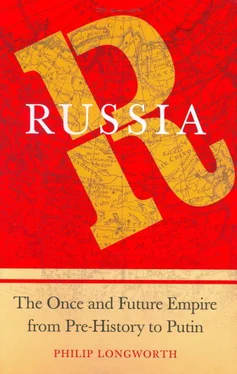On the other hand metropolitans provided grand princes with substantial political support. The Orthodox Church believed that it should always work ‘in symphony’ with the legitimate, God-given, ruler. But circumstances made it particularly anxious to do so. Since the Great Schism in the Church, the Latin West, led by the Pope, had been trying to encroach on the ecclesiastical territory of the Orthodox Church, and — especially now that the struggle for the spiritual destiny of Lithuania loomed so large — the Church needed the Grand Prince’s support. Even so, the Grand Principality of Moscow itself was in a difficult strategic position, repeatedly in danger, placed as it was between the pincers of two dangerous enemies: the Tatars to the east and the Lithuanians to the west.
Besieged by Lithuanian armies in 1368 and again in 1370, it was captured and laid waste by Tatars in 1382, and besieged again in 1408 by the Tatar Yedigei, who extracted a large ransom for it. A Tatar army reached Moscow again in 1439, though by then its walls were built of stone and brick rather than of earth and timber. And the Tatars would still return thereafter, even though the city was no longer easy prey. Abandoning Moscow and fleeing with one’s treasure at the approach of an enemy was to become an almost routine practice for Moscow’s rulers. Yet somehow they survived the repeated assaults of external enemies. But then civil war erupted.
Grand Prince Dmitrii was to be succeeded by his eldest son, Vasilii I, and his grandson, Vasilii II. But, though their combined reigns lasted almost three-quarters of a century — from 1389 to 1462 — they were to be less fortunate than Dmitrii. From the beginning of his reign Vasilii I was overshadowed by the high-riding Grand Duke of Lithuania. Nevertheless, he seized opportunities when he could. When the Tatars were diverted by their enemies in the east, he annexed the strategic principality of Nizhnii-Novgorod further down the Volga, though he failed to impose effective rule over all of it. In 1398 he tried to seize another strategic asset, (this time from Novgorod the Great): the valley of the Northern Dvina. He was repulsed. He tried again, without success, in 1401.
While Moscow struggled against its neighbours to the east and west, restive subordinate principalities tried to wriggle their way towards greater autonomy. The dreaded Khan Tamerlane created panic by leading his army towards Moscow. Then he swung away towards the east and the panic subsided. Moscow was at war with Lithuania from 1406 until 1408, and that same year Yedigei’s Tatar army returned to pillage Vladimir. Russian renegades as well as Tatars took part in that operation. At the same time Vasilii was faced with a determined Lithuanian attempt to supplant Moscow as centre of the Orthodox Church. Vasilii I was a successful ruler only in the sense that, though he suffered many reverses, he managed to avoid disaster. His son Vasilii II did not fare so well. 24
Vasilii II was only ten when, in 1425, he acceded to his father’s throne. Provision had been made for his minority: a council of regents was to govern till he came of age. His mother and her father, Grand Duke Vitovt of Lithuania, were among its members. So were his uncles Andrei and Petr, his future father-in-law Prince Iaroslav of Sepukhov, and his brother Semen, both of them great-grandsons of Ivan ‘Money-Bag’. The regency was knitted together by close kinship and political interest. But someone of account had been excluded: the boy-prince’s eldest uncle, lurii, whose power base included the profitable salt-producing region around Galich and Chukhloma and also Zvenigorod only a few miles to the west of Moscow. lurii immediately claimed the throne on the ground of traditional, lateral succession in the House of Riurik. Moral pressure from the Patriarch Photius persuaded him to drop his claim — but not for long. When Photius and Grand Duke Vitovt died, he reasserted it and was soon in command at Moscow. Vasilii was forced to swear homage to his uncle and content himself with the Principality of Kolomna as his inheritance. The year was 1433; Vasilii was eighteen.
Many Muscovite notables would not accept lurii as grand prince, however, and the upshot was civil war. An army of Vasilii’s supporters sacked Iurii’s base at Galich, but the following year lurii counter-attacked and Vasilii himself was defeated and taken to Moscow, this time as his uncle’s prisoner. Fortunately for him, lurii died suddenly; but then his sons took up their father’s claim. In 1436 Vasilii captured the elder of them, his cousin Vasilii Kosoi, and blinded him. But he was not secure as grand prince, and for the next several years he was absorbed in trying to exert an effective grip on his domains, keeping the Tatars out, and reacting to a crisis in the Church. 25
The throne of the metropolitan had remained empty since Photii’s death. It was eventually filled by Isidore, a Greek from Constantinople. But Isidore soon accepted an invitation to attend a Church council in Italy sponsored by the Pope. The papacy had long wanted to unite the Eastern and Western Churches on his own terms. With the Ottoman Turks pressing in on Constantinople from every side, the Emperor was desperate for aid and all for compromise. So was Russia’s Greek patriarch. But most Russians found the idea appalling. For them the only true Christian faith was their faith. The ‘Latins’, such as the crusaders from north-west Europe, who had exhibited such greed, depravity and lack of sexual restraint when they had sacked Constantinople in 1204, no longer observed the practices, still less the morality, of the Orthodox Christian faith. And so, when Isidore returned to Russia from Ferrara in 1441, having agreed to acknowledge the Pope, Vasilii ordered his arrest. A more reliable Russian bishop eventually took his place, but not for seven years. For that period the cruel, unfortunate, Vasilii lacked the support his predecessors had come to rely on in difficult times. And before the situation was resolved his former enemies returned to haunt him.
A substantial fraction of what remained of the Golden Horde, led by Ulug-Mehmet, had taken to regularly pillaging Muscovite territory. Vasilii had tried to counter its raids without much success, and when, in 1445, he was confronted by it before all his forces could be mustered he suffered a disastrous defeat and was taken prisoner. Ulug-Mehmet thought of replacing Vasilii with Dmitrii Shemiaka, Vasilii’s cousin, but eventually he sent 500 warriors to escort the Grand Prince back to Moscow. Vasilii returned in shame to a capital which had suffered a disastrous fire in his absence. Worse, Dmitrii now managed to raised support from among the Muscovite elite, and when the Grand Prince left town on a pilgrimage to the Holy Trinity Church and the shrine of St Sergius at Zagorsk, Dmitrii and his friends took possession of Moscow.
Soon afterwards, Vasilii was taken prisoner, whereupon Dmitrii, in revenge for his brother Vasilii Kosoi, had his eyes put out. Thenceforth the victim was known as Vasilii the Blind. Surprisingly, perhaps, the act did not emasculate him politically, but this was chiefly because of Dmitrii’s mistakes. Rather like Richard III as pictured by Shakespeare, Dmitrii imprisoned Vasilii’s young sons. This alienated many Russians, and when Vasilii journeyed to Tver people of many camps, including two of Ulug-Mehmet’s own sons, came to join him on the way. By the time he turned back towards Moscow his following had grown into an army. Seeing no hope, Dmitrii abandoned the city. There ensued a slow but inexorable pursuit, and Dmitrii eventually submitted, and swore loyalty to Vasilii, in 1448. But as soon as Novgorod decided to lend him its power he reneged. By now he represented the interests of some of the more important principalities which were resisting the imposition of Moscow’s supremacy, but within two years his forces had been overcome, his city of Galich had been captured, and he himself had been forced into exile in Novgorod, where, many months later, Vasilii’s agents succeeded in poisoning him.
Читать дальше





![Stephan Orth - Behind Putin's Curtain - Friendships and Misadventures Inside Russia [aka Couchsurfing in Russia]](/books/415210/stephan-orth-behind-putin-s-curtain-friendships-a-thumb.webp)





